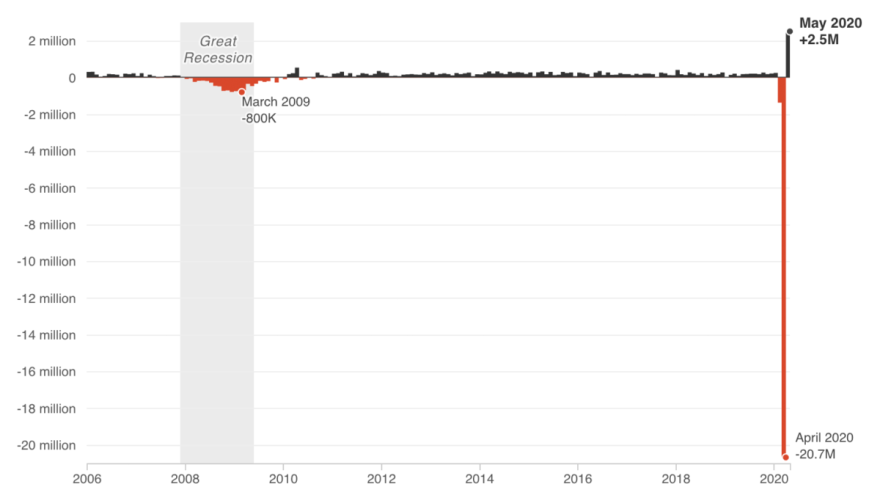President Trump's remarks are scheduled to begin at 10 a.m. ET.
Updated at 9:51 a.m. ET
The U.S economy rebounded with surprising strength last month as businesses began to reopen from the coronavirus lockdown. U.S. employers added 2.5 million jobs in May, as the unemployment rate fell to 13.3%.
That's still extremely high by historical standards, but much better than forecasters were expecting. It reflects an improvement over April's jobless rate of 14.7%.
April saw nearly 20.7 million jobs lost, as the U.S. slammed the brakes on its economy in a desperate effort to slow the spread of the pandemic.
Stock indexes opened sharply higher after Friday's jobs report was released. The Dow Jones Industrial Average jumped 715 points or 2.7% and the S&P 500 was up 2%.
The pace of pandemic layoffs has slowed in recent weeks. And some people who were idle in April were called back to work last month as business started to reopen.
Hairdresser Megan Hanneken has not been recalled yet, but she expects to go back to work in a few weeks as Michigan relaxes its stay-at-home orders. Her customers have been getting impatient.
"I've never felt so valued as a hairstylist, which is wonderful," Hanneken says. "But I also want to laugh when people are so upset about their hair. I'm like, 'You guys, it's hair.' "
Hanneken says she's prepared to take precautions to avoid spreading the virus, but she's not looking forward to wearing a mask all day or trying to cut hair with gloves on.
"I've seen pictures — during the 1918 flu pandemic — of open-air beauty salons. People were cutting hair outside," she says. "How I wish that were the case now. That would be so preferable to me than being in a hot salon with a mask on."
Michigan's unemployment rate in April was eight points above the national average and second only to Nevada.
Black and brown workers continue to see elevated rates of unemployment, underscoring the persistent racial inequalities that have fueled protests in cities throughout the country. The jobless rate for African Americans in May was 16.8% — slightly higher than the April figure. Unemployment for Latinos dropped from 18.9% in April to 17.6% last month.
Weekly unemployment claims show more than 37 million Americans are either receiving jobless benefits or applied recently and are awaiting approval.
Job gains in May reflect a turnaround for some of the industries hardest hit by the lockdown. Bars and restaurants added 1.4 million jobs, after losing 6.1 million in March and April.
Bartender Susan McAleer was laid off on St. Patrick's Day from a restaurant in Philadelphia. She says the extra $600 a week in benefits the federal government authorized during the pandemic has been a critical lifeline.
"That makes all the bills payable," she says. "But I also don't know what's going to happen after July when they cut if off."
McAleer is doubtful about returning to the restaurant, which used to serve a lot of tourists and theatergoers, before those disappeared. She also wonders how servers will be able to do their jobs while limiting contact in a tight space.
"You can't even have salt-and-pepper shakers," she says. "Do we have to salt and pepper everybody's food?"
Bars and restaurants saw a significant comeback in May, after steep losses the month before. Moody's Investors Service says many of those jobs will be slow to return.
"Until there is a vaccine or effective treatment for the coronavirus, this jobs gap is unlikely to close given the high-contact nature of the sector," Moody's analysts wrote in a report.
Other industries, such as health care and manufacturing, could rebound more quickly.
Despite the pandemic, 1.5 million health care jobs were lost in April, as doctors and dentists closed their offices to all but emergency patients. But health care added 312,000 jobs last month.
Sara Goldberg doesn't expect to go back to her old job as a medical assistant in South Portland, Maine. The office where she worked has embraced online visits during the pandemic, and Goldberg thinks it may stick.
"I talked to some friends who said, 'I had my physical via telemedicine and it was great,' " Goldberg says. "And the thought went through my head, 'Well, there goes my job.' "
She applied for work at a nearby school district, but the economic crisis has put a huge dent in state and local government coffers.
"I found out just yesterday that because of budget constraints, they aren't filling any of the open positions right now," Goldberg says. "I guess I'm going to have to get creative."
Copyright 2020 NPR. To see more, visit https://www.npr.org.




